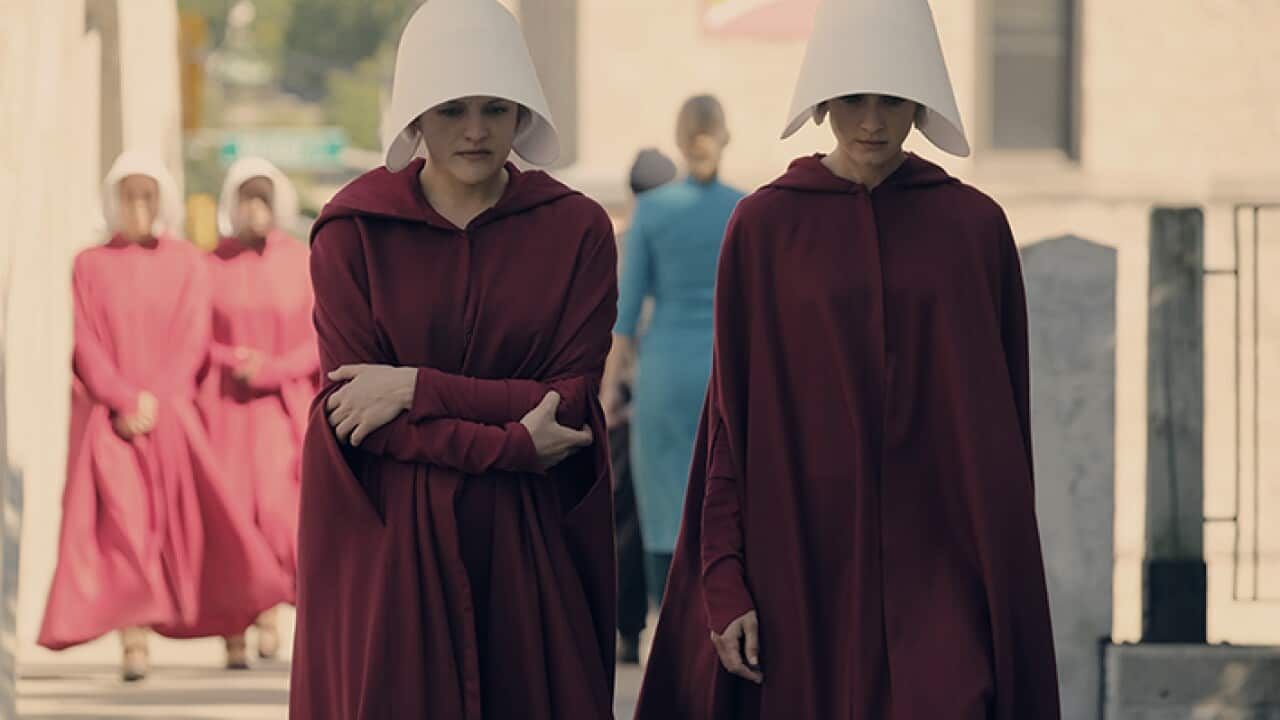Near the start of , the dystopian Margaret Atwood novel that’s been recently adapted into a chillingly prescient series by Hulu, the narrator, Offred, discovers her bank accounts have been frozen and her debit card doesn’t work. That this incident is less a mild annoyance than it is jarring reminder that Offred is about to have the autonomy she holds over her life and body stripped away from her isn’t surprising.
As Alana Massey puts it in , the adage “money can’t buy you happiness” is ostensibly designed to warn us against shallow materialism, as if caring about money is a sign of our deeply ungenerous spirit. But this also overlooks the complex relationship between a woman’s emotional health and the state of her bank balance.
A March 2016 National Australia Bank survey as the biggest source of stress for Australian women under 30 and found that women earning less than their male colleagues were four times likelier to suffer an anxiety disorder than their male counterparts.
The adage “money can’t buy you happiness” is ostensibly designed to warn us against shallow materialism, as if caring about money is a sign of our deeply ungenerous spirit.
Another US study which revealed that , despite a similar level of education, suggests that these statistics worsen once they’re inflected by factors like race and class. Thinking about scrapping boardroom politics and writing the Great Australian Novel or launching the hand-made ceramics business you’ve been dreaming about since your childhood yen for Play-Doh? Not so fast: estimates the pay gap between self-employed men and women at 40 percent.
Manjula Martin, is the editor of , an anthology that aims to dispense with the secrecy around the way writers fund their careers. She tells SBS that part of the problem is down to the fact that men are rewarded for discussing and pursuing money. But for women, this has the opposite effect.
A 2016 study found that women earning less than their male colleagues were four times likelier to suffer an anxiety disorder than their male counterparts.
“Male authors are often lauded for having swagger and confidence, while that same type of behaviour might be perceived as unlikable or bitchy in a woman,” she observes. “This extends to discussion of money, and in particular pitching and negotiating. Because of sexist power dynamics in these industries, there's often a perception that it's not "nice" for a woman to talk about money, or that asking for suitable compensation means a writer doesn't also "love" her work.”
It’s not a new idea that women who aggressively seek money are considered unlikeable — after all, is there a cultural figure we loathe more than the gold-digger, who’s, strangely enough, always coded female? But what’s interesting is the way these sexist power dynamics have helped validate the message that being forthright about our finances is a cultural taboo.
A 2015 report from , 80 percent are uncomfortable discussing money with family and friends (the majority are happier having intimate medical conversations with a doctor).
It’s not a new idea that women who aggressively seek money are considered unlikeable — after all, is there a cultural figure we loathe more than the gold-digger, who’s, strangely enough, always coded female?
And a May 2017 survey conducted by the writer Ashley Ford for found that millennial women were conflicted about being the breadwinner. This makes sense when you consider that the patriarchy thrives on punishing women with masculine attributes. September 2016 research from the found that Australian women ask for wage rises just as often as men but men are 25 percent more likely to be successful.
Honor Eastly, the creator of, a podcast that aims to create radical transparency around art, money and creative careers, believes that the historical devaluation of women’s work coupled with the impact of privilege can have a profound effect on our financial fate.
“[In the creative industries] pay rates are often inconsistent and mysterious,” she says. “When you combine this with the complexities around women and labour, the fact that women’s work has historically been devalued and the culture’s negative perception of assertive, financially independent women then it makes sense that women might feel like they have less agency around their financial situation.”
To be a women is to be subject to an endless barrage of advice about how to improve your circumstances (grow your hair! learn to negotiate!) but Eastly believes that the “Lean In” message — the one that tells us that changing our behaviour is ticket to financial empowerment — isn’t as helpful as sharing knowledge and resources with others who’ve felt these pressures too.
To be a women is to be subject to an endless barrage of advice about how to improve your circumstances.
“This is a structural issue, so it’s important to not push the message that women need to fix themselves to end pay inequity,” she says. “Through my podcast, I’ve found an affinity with the women I’ve interviewed and finding some community around these questions has been the way towards financial freedom.”
It’s surely an approach that even Offred could get behind given a chance.
The Handmaid’s Tale is making its Australian debut exclusively on with all ten episodes available to stream in full from July 6.



